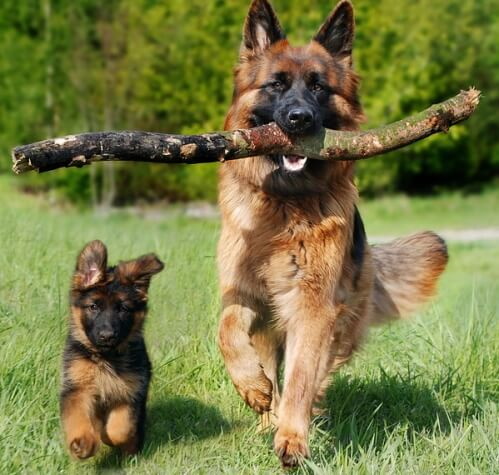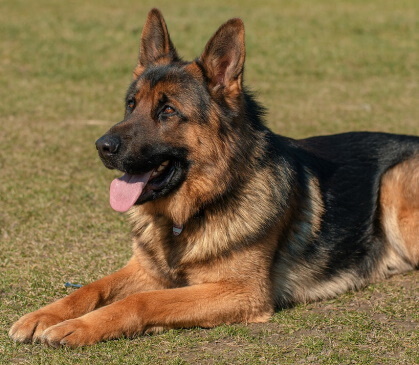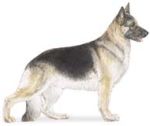German Shepherd Dog
A Much Admired And Intelligent Dog!
The German Shepherd Dog, is of true German origin, with most credit for the breed's development being given to Max von Stephanitz during the late 19th century.
 Image by AnjaGh
Image by AnjaGhThe breed was at one time called the Alsatian, but later that was changed and he now remains universally known
by his present name. During World War I, it is said that 48,000 of these dogs were taken from
their owners for war service.
Although this breed is classified under herding dogs and was originally developed as a worker for pastoral duties, his talents go way beyond the farm.
He is an extremely versatile dog with multiple capabilities. In
fact, he is among the top
breeds chosen for work in search and rescue, mine detection, drug
detection, guarding, security, and providing assistance to the disabled.
The German Shepherd Dog is handsome and dignified with an alert expression and confident
demeanor. He at once gives an impression of both strength and agility.
Well-balanced, substantial and muscular, his a body is slightly longer than its height. Oddly enough, he
has a low pain tolerance and a very sensitive stomach.
Characteristics of the German Shepherd Dog
The German Shepherd Dog is one of the most popular dogs in the United States. That being
said, his popularity has led to some indiscriminate breeding.
What this means, is that
without due diligence, you may unknowingly acquire a dog that does not live up to the
wonderful qualities usually associated with this breed.
Dogs from this breed that get a bad
wrap, have usually been the result of bad breeding.
Institutions that train this dog for specific duties, generally obtain their dogs from Germany where breeding standards have been more consistently maintained. Fortunately, responsible breeders here in the United States are working toward restoring the best qualities of the line.
 Courtesy Adam Kontor
Courtesy Adam KontorGiven a well-bred dog, you may expect to enjoy a very smart companion who can learn almost anything,
as he has ably demonstrated to the world. However, he is aware of his power and potential
and needs a firm, but not harsh, hand to lead him.
As a family companion, he is devoted, loyal and courageous. He very much enjoys close ties to his family and is said to have human-like intelligence.
German Shepherds are athletic and do very well in the competitive arena showing excellence in agility,
flyball, tracking and also in obedience.
Appearance And Grooming

Height: 22-26inches
Ideal standard weight: 75-85 pounds
Coat colors: Most rich colors
are preferred. Often seen are Black and Tan, Light Gray, Gold, and Sable. White is
disqualified in the standard.
The double coat is mostly seen in a medium length, with the outer coat
being dense, harsh and straight, but some are seen in longer wavier
coats.
Hair around the head, paws and legs is short, with thicker and longer
hair around the neck.
This breed does shed a lot year-round in addition to the periods of seasonal shedding when it is really heavy. Owners have found an
Undercoat Rake
to be a "must have" tool in their grooming arsenal. This, used along with a FURminator, will keep the inner and outer coat shedding well-managed.
For general coat maintenance owners will also want to have a comb, some brushes such as Pin, Bristle
and Slicker types, plus a pair of Round Tip Shears for touch-up trimming.
Bathing only needs to be done as necessary, but as German Shepherds are
prone to skin allergies, it's best to select a hypoallergenic shampoo
without soap to prevent skin problems and loss of protective natural oils.
If the coat is kept in good condition, maintenance doesn't have to take up too much time.
Health of the German Shepherd Dog
- Hip and elbow dysplasia: This are genetic issues involving the hip and elbow joints, resulting in pain, muscle loss and lameness. Both are degenerative diseases, but there are many treatments and therapies available. Joint diseases can affect any dog, but they are more common in larger breeds, such as the GSD.
- Degenerative myelopathy: A progressive adult-onset neurodegenerative disease that affects the spinal cord, and leads to paralysis. The disease is fatal. A DNA test for use by vets, breeders and pet owners through the OFA (Orthopedic Foundation for Animals – ofa.org) is now available to identify this disease.
- Bloat: Otherwise known as gastric dilatation-volvulus (GDV), is a life-threatening condition affecting large breed dogs where the stomach fills up with food or air and twists. The main symptoms include non-productive retching (trying to vomit but no vomit is produced) and abdominal distension. If you notice these symptoms, please take your dog to the vet immediately. Typically, emergency surgery is needed.
- Skin allergies: These can be seen in many forms such as itching, flaky skin, hot spots, sneezing, hair loss etc. If severe, work with your vet to uncover the cause.
The German Shepherd Dog Club of America recommends the following health tests.
- Hip Evaluation
- Elbow Evaluation
- Temperament Test
Responsible breeders will have screen the dogs they plan to breed for these conditions and make the results available when they offer puppies for sale.
This breed is prone to many health problems - digestive problems being high on the list - and should be fed a high quality nutritious diet to provide the best support to their immune system.
With the benefits of good nutrition, adequate exercise, and regular veterinary oversight, pet parents can expect to enjoy their German Shepherd dog for up to 14 years.
Activity Level
Regular daily walks are the name of the game for the German Shepherd dog. His active mind
enjoys both mental and physical challenges and outlets.
He will do well and make you proud if trained in competitive sports such as flyball and agility.
This loyal dog loves to be in close contact with his human family pack
and should not be left outside without companionship and activity.
If you can't provide him with close attention and are rarely home, this is not the breed for you and the pet would suffer.
Ideal Living Space
Ideally, this breed needs a securely fenced yard in which to exercise freely in addition to being taken out for regular walks.
He does not bark without good cause, so apartment living can be sufficient if
regular outings and walks are provided.
The German Shepherd And Children?
The German Shepherd Dog has a good reputation with children in a home where he has been
well-socialized and trained by his master from an early age. An active family is the ideal and due to his size, a family with
well-behaved older children is best.
The best policy to follow, no matter what the breed of dog, is to always have an adult supervise activities between pets and children.
Senior Or More Sedentary Households?
Due to their success as a service dog, a trained dog of this breed can make an excellent companion and watchdog for a senior or sedentary family.
Providing the necessary exercise requirements for good health has to part of the deal or otherwise arranged.
Tell Us About Your German Shepherd
Do you have a German Shepherd dog? If you do, we know you must be proud to own this wonderful dog breed.
We would love for you to share your dog's pictures and his story as well as your knowledge about the breed in general.
You can upload photos and tell your dog's story here.
For inspiration, read some of the stories already submitted by other dog lovers.
Before You Go...
If you like the content of this page, as well as others on my site, please give it some love by clicking on the heart in the lower right hand corner. This helps me keep providing enjoyable and useful content.
Thank you.
- Home ›
- AKC Breeds ›
- Herding Breeds ›
- German Shepherd


